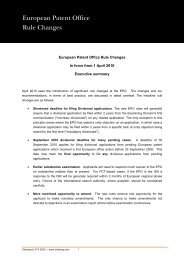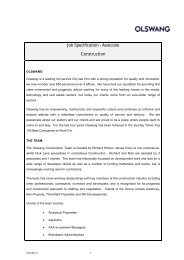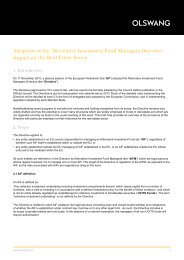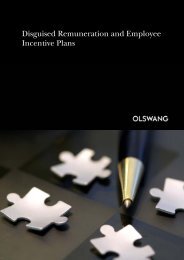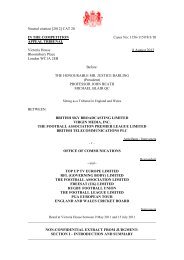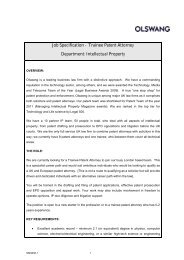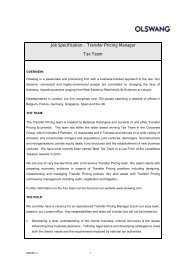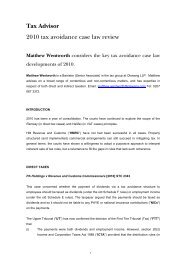Finance Update March 2009 - Olswang
Finance Update March 2009 - Olswang
Finance Update March 2009 - Olswang
You also want an ePaper? Increase the reach of your titles
YUMPU automatically turns print PDFs into web optimized ePapers that Google loves.
•<br />
<strong>Olswang</strong> © 2008 | www.olswang.com<br />
<strong>Finance</strong> <strong>Update</strong><br />
<strong>March</strong> <strong>2009</strong>
General <strong>Finance</strong><br />
General <strong>Finance</strong> News<br />
Association of Corporate Treasurers (ACT)<br />
The ACT has published a report entitled 'Credit crisis and corporates – funding and beyond'. This<br />
report looks at the impact of the credit crisis on the treasury plans of the top 350 quoted businesses, after<br />
conducting a series of interviews with members of the ACT. It considers the current conditions in the<br />
market, the views of these companies on the availability of credit, feedback on banks and the derivatives<br />
market and some views on what the next few years are likely to hold.<br />
Banking Act <strong>2009</strong><br />
The Banking Act <strong>2009</strong> came into force on 21 February <strong>2009</strong>. This Act is divided into a several sections:<br />
• Part 1 – special resolution regime to deal with banks facing financial problems which replaces the<br />
temporary powers under the Banking (Special Provisions) Act 2008;<br />
• Parts 2 and 3 – new bank insolvency and bank administration procedure, both of which are largely<br />
based on the existing procedures set out in the Insolvency Act 1986 (as amended by the<br />
Enterprise Act 2002);<br />
• Part 4 – framework for changing the Financial Services Compensation Scheme;<br />
• Part 5 – inter-bank payment systems;<br />
• Part 6 – issues relating to bank notes in Scotland and Northern Ireland; and<br />
• Part 7 – miscellaneous issues, including the governance of the Bank of England and an index of<br />
terms defined in the Act.<br />
Companies Act 2006<br />
The following legislation has been published in relation to the Companies Act 2006:<br />
• the draft Companies Act 2006 (Accounts, Reports and Audit) Regulations <strong>2009</strong> were<br />
published on 6 February <strong>2009</strong>. These need to be approved by both Houses of Parliament;<br />
• the Companies Act (Disclosure of Address) Regulations <strong>2009</strong>, together with an explanatory<br />
memorandum, were published on 16 February. These specify the conditions for disclosure of the<br />
directors' residential addresses to public authorities and credit ratings agencies. These regulations<br />
will come into force on 1 October <strong>2009</strong>;<br />
<strong>Olswang</strong> © 2008 | www.olswang.com 1
General <strong>Finance</strong><br />
• the Companies Act (Trading Disclosures) (Amendment) Regulations <strong>2009</strong>, together with an<br />
explanatory memorandum, were published on 16 February <strong>2009</strong>. These deal with the trading<br />
disclosures to be made by a company and provide further exceptions from the obligation on a<br />
company to display its registered name at business premises. These regulations will come into<br />
force on 1 October <strong>2009</strong>; and<br />
• the Department for Business, Enterprise and Regulatory Reform has updated its Companies Act<br />
2006 frequently asked questions.<br />
Compound Interest Corporate governance review of the UK banking<br />
industry<br />
On 9 February, HM Treasury announced that the government had commissioned a review of corporate<br />
governance in the UK banking industry. The review will be chaired by Sir David Walker and will look at a<br />
variety of issues, including the skill levels and experience of those on the boards of UK banking institutions,<br />
the role played by institutional shareholders and how national and international best practice can be<br />
achieved (see here for more information).<br />
European Private Company Statute<br />
The government published its response to last October's consultation on the EU proposal for a European<br />
private company. This response will form the basis of negotiations in relation to the revised text issued by<br />
the EU in December 2008.<br />
Financial Services Authority (FSA)<br />
The FSA has recently published, amongst other things, the following:<br />
• a consultation paper on strengthening liquidity standards in December 2008. The measures<br />
proposed in the consultation paper aim to enhance firms’ liquidity risk management practices.<br />
However, they are wide-ranging and would impose significant additional burdens on banks and<br />
financial institutions;<br />
• a business plan for <strong>2009</strong>/10 setting out its programme of work for the year ahead, outlining its<br />
specific priorities and initiatives in light of the current economic climate; and<br />
• a draft code of practice on remuneration policies on 26 February <strong>2009</strong>. This was published in<br />
conjunction with the Government's announcement about its Asset Protection Scheme. This code of<br />
practice will form part of the eligibility criteria for participating this Scheme. The draft code will be<br />
the subject of a formal consultation process during <strong>March</strong> <strong>2009</strong>.<br />
<strong>Olswang</strong> © 2008 | www.olswang.com 2
General <strong>Finance</strong><br />
Law Commission<br />
At the end of 2008, the Law Commission published its final report on reforming the law on bribery and<br />
corruption. At present there are several overlapping, but distinct, corruption offences under a variety of<br />
statutes dating from the 19th Century onwards, as well as an older common law offence of bribery. The<br />
Commission proposes that the existing offences be replaced by two general offences of bribery: one<br />
concerned with giving bribes, the other with taking them. Two new specific offences are also proposed: an<br />
offence of bribing a foreign public official and a corporate offence of negligently failing to prevent bribery by<br />
an employee or agent. The Commission also recommends that the law of bribery be extended to cover<br />
foreign nationals who reside in the UK and conduct their business here. The same set of provisions would<br />
cover both the private and public sectors. (Click here for the report and a six-page summary of the<br />
proposed offences.)<br />
Loan Market Association (LMA)<br />
On 29 September the LMA published an amended version of the leveraged facilities agreement containing<br />
The LMA Intercreditor Agreement has been released and is now available on the LMA website, along with<br />
a Users' Guide. The LMA Intercreditor Agreement is designed for use with the LMA Leveraged Facility<br />
Agreement. In addition, it aims to deal with derivatives in complex transactions, such as those where<br />
multiple hedge counterparties are involved.<br />
The LMA have also posted on their website the following documents:<br />
• LMA Mandate Letter - Joint Arrangers – Underwritten;<br />
• LMA Mandate Letter - Joint Arrangers - Best Efforts;<br />
• LMA Syndicate Member Commitment Letter For Primary Syndication - for final commitment with<br />
approval of documentation;<br />
• LMA Syndicate Member Commitment Letter For Primary Syndication - for initial commitment<br />
without approval of documentation;<br />
• LMA Confidentiality and Front Running Letter of Undertaking;<br />
• LMA Front Running Letter of Undertaking;<br />
• LMA Front Running Letter of Undertaking Users' Guide;<br />
• Syndication Closing Timeline;<br />
• Syndication Decision Chart - Unsuccessful Syndication;<br />
<strong>Olswang</strong> © 2008 | www.olswang.com 3
General <strong>Finance</strong><br />
• Syndication Decision Chart - Successful Syndication; and<br />
• Explanatory Memo Relating to Mandate Letters, Commitment Letters, Front Running Letters,<br />
Syndication Closing Timeline and Syndication Decision Charts.<br />
Payment Services Regulations <strong>2009</strong><br />
The Payment Services Regulations were published on 13 February <strong>2009</strong> in order to implement a<br />
European Directive (DIR 2007/64/EC). These regulations, amongst other things, establish an authorisation<br />
regime for providers of payment services and set out the activities which authorised payment institutions<br />
are allowed to engage in. It came into partial effect on 2 <strong>March</strong>, with further provisions coming into effect<br />
on 1 May <strong>2009</strong> and full implementation occurring on 1 November <strong>2009</strong>.<br />
Interest Rates<br />
On 5 February, the Bank of England Monetary Policy Committee announced a further interest rate cut of<br />
0.5% to 1.0% (this was agreed by 8 members of the committee, with the one dissenting voter voting for a<br />
1% rate cut). On 5 <strong>March</strong> the Bank of England announced a further reduction of 0.5% to 0.5%, along with<br />
a programme of asset purchases of £75 billion financed by the issuance of central bank reserves (see<br />
here for more information on how the asset purchase programme will work).<br />
On 5 <strong>March</strong>, the European Central Bank cut interest rates by 0.5% to 1.5% across the euro-zone. This is<br />
reduction of 2.75% since 8 October 2008.<br />
World Markets<br />
The National Institute of Economic and Social Research predicted that consumer spending is set to fall by<br />
3.8% this year, double the largest previous drop of 1.6% in 1991. It also predicted that the UK economy is<br />
likely to shrink by 2.5% this year and that any recovery is not expected until the end of the year at the<br />
earliest. According to the CBI, 59% of companies surveyed expect access to credit to deteriorate over the<br />
course of the next three months and retailers are finding it harder to get trade credit insurance to insure<br />
against business partners going bust. The CBI has also predicted that unemployment in the UK will reach<br />
2.9 million by the end of this year.<br />
Over the weekend of the 14/15 February the <strong>Finance</strong> Ministers and Central Bank Governors of the G7<br />
countries met in Rome to discuss measures to stabilise the global economy. They acknowledged that the<br />
downturn is likely to persist through most of <strong>2009</strong>, that more capital would be needed to restart global<br />
credit markets and that it is important for countries to avoid protectionist measures.<br />
During the course of February the former bosses of RBS and HBoS apologised for their banks' failures.<br />
However, there has been an on-going debate over payment of discretionary bonuses to bankers at certain<br />
banks, including RBS. On 13 February the newly formed Lloyds Banking Group announced expected<br />
losses of £10billion at HBoS's mortgage unit. Following this, at the start of <strong>March</strong>, the government<br />
<strong>Olswang</strong> © 2008 | www.olswang.com 4
General <strong>Finance</strong><br />
increased its stake in the Lloyds Banking Group to 75% ownership after converting preferred shares into<br />
ordinary stock. In return for its controlling share, government funds will be used to insure £260bn pounds<br />
of the company's assets.<br />
Towards the end of February, financial markets around the world fell as concerns about the recession<br />
increased, the FTSE 100 fell to below 4,000 on 20 February, down 7.1% in one week and the Dow Jones<br />
fell to a twelve year low, finally settling at a six year low by the end of the week. Stock markets around the<br />
world fell again at the start of <strong>March</strong>, as AIG announced losses of £44bn, the largest quarterly loss in<br />
corporate history.<br />
<strong>Olswang</strong> © 2008 | www.olswang.com 5
General <strong>Finance</strong><br />
General <strong>Finance</strong> Cases<br />
Bank charges<br />
The case of Abbey National plc & 7 Ors v Office of Fair Trading [<strong>2009</strong>] EWCA Civ 116 followed the cases<br />
decided last year and earlier this year between these parties (summaries of these decisions can be found<br />
in the May 2008 <strong>Finance</strong> <strong>Update</strong>, the October 2008 <strong>Finance</strong> <strong>Update</strong> and the February <strong>2009</strong> <strong>Finance</strong><br />
<strong>Update</strong>).<br />
Facts: The banks appealed against the decision that the Office of Fair Trading (OFT) was entitled to<br />
assess the fairness of certain bank charges (see the May 2008 <strong>Finance</strong> <strong>Update</strong>).<br />
Decision: It was held that the relevant terms were not protected from the assessment of fairness under the<br />
Unfair Terms in Consumer Contracts Regulations 1999, Regulation 6(2)(b). Therefore the appeal was<br />
dismissed.<br />
Comment: The banks may still apply for permission to appeal this decision to the House of Lords. If not,<br />
this decision means that the OFT could rule that the charges are unfair once it has had time to examine the<br />
relevant terms and conditions in detail. It is expected to reach a final decision in relation to this later this<br />
year.<br />
Shareholder Compensation<br />
In the case of R (on the application of (1) SRM Global Master Fund LP (2) RAB Special Situations (Master)<br />
Fund Ltd (3) Dennis Grainger & Ors) (Claimants) v Treasury Commissioners (Defendant) & Legal &<br />
General Investment Management Ltd (Interested Party) [<strong>2009</strong>] EWHC 227 it was held that the legislation in<br />
relation to the amount of compensation to be paid to the former shareholders of Northern Rock, on its<br />
nationalisation last year, did not contravene the European Convention on Human Rights. Therefore, the<br />
application would be dismissed.<br />
<strong>Olswang</strong> © 2008 | www.olswang.com 6
Real Estate <strong>Finance</strong><br />
Real Estate <strong>Finance</strong> News<br />
Mortgage Rescue Scheme and Homeowners' Mortgage Support Scheme<br />
The government has announced further details of the Homeowners' Mortgage Support Scheme, which will<br />
allow borrowers with mortgages of up to £400,000 to take a payment holiday if they suffer an income<br />
reduction, either through losing their job or having their hours cut (for more information see here).<br />
The Law Society has updated its practice note on mortgage repossessions to include information on<br />
the Mortgage Rescue Scheme (for more information on this Scheme see here).<br />
Land Registry<br />
From 28 February <strong>2009</strong> the Land Registry began destroying paper documents, where a scanned image<br />
exists on the Land Registry database. Requests for return of paper documents can still be made after this<br />
date but they may be too late.<br />
Real Estate <strong>Finance</strong> Market<br />
Data from the Council of Mortgage Lenders (CML) published on 12 February shows that mortgage lending<br />
has fallen to a 34 year low, falling to 516,000 mortgages in 2008, down 49% from 2007. According to<br />
Nationwide, house prices fell by 1.8% in February and have fallen 17.6% since the same time last year,<br />
this is despite interest rate cuts and reports of rising enquiries from prospective buyers. This fall in<br />
property prices has brought house prices back down to levels seen in 2004, with some of this being<br />
blamed on the lack of mortgages available on the market. According to Jones Lang LaSalle's latest<br />
Residential Market Forecast, house prices are set to fall further with an annual drop of 13-15% expected<br />
during <strong>2009</strong>. House sales are at their slowest in 30 years, with three properties being sold per estate<br />
agent on average in January, according to the Royal Institution of Chartered Surveyors. According to<br />
CML, the number of repossessions rose significantly in 2008 to a 12 year high, although the figures were<br />
11% lower than was forecast.<br />
According to the latest data from the Bank of England, in net terms the total bank lending in the 4th quarter<br />
of 2008 for commercial property was negative at -£5.3bn (this figure has not been negative since the end<br />
of 2004). At the same time UK commercial property prices have continued to fall and according to the IPD<br />
UK annual index they fell 26.3% in 2008 (this is faster than during the 1930s). The number of property<br />
sector insolvencies also rose in the 4th quarter of 2008 to 1,935, a 176% increase according to Experian.<br />
House building levels have fallen to the lowest level on record according to figures released by the<br />
Department for Communities and Local Government.<br />
<strong>Olswang</strong> © 2008 | www.olswang.com 7
Restructuring and<br />
Insolvency<br />
Restructuring and Insolvency News<br />
Pre-Packs<br />
The Insolvency Service has published information on its website entitled 'How to complain about the<br />
misuse of the pre-pack administration process (or any other corporate insolvency process)'. This<br />
has been produced in response to the criticism pre-packs have recently received as a method of allowing<br />
businesses to walk away from their debts.<br />
Restructuring and insolvency market<br />
According to Experian, business failures rose by 78% in January. This follows a 30% rise during 2008 with<br />
an average of 65 firms becoming insolvent every day. It is expected that at least 30,000 firms will become<br />
insolvent during the course of <strong>2009</strong>.<br />
The Ministry of Justice published 'Company winding up and bankruptcy petition court statistics –<br />
fourth quarter 2008'. According to this report, in the fourth quarter of 2008, the following petitions were<br />
issued:<br />
• 3,382 company winding up petitions – an increase of 3% on the same period in 2007 and a 6%<br />
increase on the previous quarter;<br />
• 4,722 creditors' petitions – an increase of 3% on the same quarter in 2007 and a 15% decrease on<br />
the previous quarter; and<br />
• 15,358 debtors' petitions – an increase of 32% on the same quarter in 2007 and a 12% increase<br />
on the previous quarter.<br />
<strong>Olswang</strong> © 2008 | www.olswang.com 8
Restructuring and<br />
Insolvency<br />
Restructuring and Insolvency Cases<br />
Liquidators<br />
In the case of Managa Properties Ltd v Louise Brittain [<strong>2009</strong>] EWHC 157 (Ch) it was held that a court<br />
would not direct a company in compulsory liquidation to convene a creditors' meeting to consider the<br />
replacement of the liquidator, unless doing so would be in the best interests of the liquidation.<br />
Facts: The applicant (M) was dissatisfied that the liquidator (L) had neither accepted nor rejected the proof<br />
of debt submitted. M served a notice on L requiring L to summon a creditors' meeting for the purpose of<br />
removing L as liquidator. L rejected this request. M then applied to court for an order under s172(3)<br />
Insolvency Act 1986 that L convene a creditors' meeting. This was dismissed and M appealed this<br />
decision and the rejection of the proof of debt it had by that stage received from L.<br />
Decision: It was held that the court had complete discretion on matters of this kind and it was necessary for<br />
M to satisfy the court that it was in the best interests of the liquidation for the creditors' meeting to be<br />
convened. As there was no justifiable criticism of L's general conduct of the liquidation, the appeal was<br />
dismissed. However, M was given leave to appeal the proof of debt.<br />
Prescribed part<br />
In the matter of International Sections Limited (in creditors' voluntary liquidation) [<strong>2009</strong>] EWHC 137 (Ch) an<br />
application was considered to disapply the prescribed part under s176A(5) Insolvency Act 1986.<br />
Facts: The liquidators applied to court to disapply the prescribed part, on the basis that the cost of making<br />
the distributions to the unsecured creditors would be disproportionate to the benefits, as even the largest<br />
unsecured creditors would receive less than £1000.<br />
Decision: The application was refused as small dividends would often result from a distribution of the<br />
prescribed part and as a significant sum remained for distribution it was not reasonable to deprive the<br />
unsecured creditors of whatever sum they might receive.<br />
(See also In the matter of Hydroserve Ltd [2007] EWHC 3026 (Ch) and In the matter of Courts plc (in<br />
liquidation) [2008] EWHC 2339 (Ch).)<br />
<strong>Olswang</strong> © 2008 | www.olswang.com 9
Restructuring and<br />
Insolvency<br />
Priority between creditors<br />
In the matter of Golden Key Ltd (In Receivership) [<strong>2009</strong>] EWHC 148 (Ch) it was held that distribution of the<br />
assets of an SIV should be made on a 'pay-as-you-go' basis rather than pari passu.<br />
Facts: The SIV confirmed the occurrence of a 'wind down event' on 23 August 2007 and could no longer<br />
pay out on matured commercial paper. The breaches triggered a mandatory acceleration event on 24<br />
August meaning that any paper not yet matured would do so on 23 September, the acceleration<br />
redemption date. The court was asked under s35 Insolvency Act 1986 for directions as to the correct<br />
method of application of the funds held by the SIV.<br />
Decision: The creditors had agreed various contractual provisions to over-rule the general insolvency rules,<br />
therefore it could not be assumed that it was intended that their rights would be governed by concepts<br />
such as pari passu, unless expressly stated. The priorities which applied before the acceleration<br />
redemption date meant that the funds should be paid out in redemption of commercial paper which<br />
reached its maturity date before the acceleration redemption date on a pay-as-you-go basis and any<br />
provisions which applied after this date were not intended to apply to any commercial paper which had<br />
already reached its maturity date.<br />
(See also In the matter of Whistlejacket Capital Ltd [2008] EWCA Civ 575 and In the matter of Sigma<br />
<strong>Finance</strong> Corporation [2008] EWCA Civ 1303.)<br />
<strong>Olswang</strong> © 2008 | www.olswang.com 10
The information in this update is intended as a general overview only of the subjects covered.<br />
Detailed specialist advice should always be taken before taking or refraining from taking any<br />
action. For more guidance on the changes and their application, please get in touch with your<br />
usual <strong>Olswang</strong> contact.<br />
<strong>Olswang</strong> © 2008 | www.olswang.com 11
About <strong>Olswang</strong><br />
<strong>Olswang</strong> is a leading business law firm with a distinctive approach. Our pioneering and problem-solving<br />
ethos has established a commanding reputation in the technology, media and real estate sectors, as well<br />
as a wide range of other industries.<br />
Founded in 1981, our Firm has grown to a team of over 600, including 90 partners, across four European<br />
offices. In addition, <strong>Olswang</strong> has a formal alliance with a major US firm Greenberg Traurig LLP and a longestablished<br />
best friends network of leading independent law firms throughout the world.<br />
Our Firm continues to be acknowledged as a leading practice in many of our core areas: <strong>Olswang</strong> was<br />
voted TMT Team of the Year 2008 at the annual Legal Business Awards; <strong>Olswang</strong>'s Corporate Group won<br />
M&A Law Firm of the Year at the M&A Awards 2008 in conjunction with M&A Magazine.<br />
Resourceful drive and a climate of shared knowledge and empowerment are the hallmarks of our<br />
meritocratic, unstuffy culture. For the last four years <strong>Olswang</strong> has been ranked in The Sunday Times 100<br />
Best Companies to Work For and our strong management team is dedicated to the personal and<br />
professional development of our people.<br />
We recruit personalities with a genuine fascination and notable reputation in the sectors they focus on,<br />
which is reflected in the quality of our advice. We also understand the importance of achieving our clients’<br />
goals and ensure that our advice is, above all else, practical.<br />
From world-class businesses to entrepreneurial startups, the rich diversity of our client base ensures a<br />
broader perspective and, as a result, deeper commercial insight. Transactional work is the most obvious<br />
feature of the role we perform. However, ongoing non-transactional support is an integral part of our<br />
business, and we focus on creating long-term relationships with our clients. We employ a range of<br />
proactive initiatives such as client care programmes, secondments, client training and feedback sessions<br />
to ensure our client relationships are strong.<br />
At <strong>Olswang</strong> the passion of our lawyers, the confidence of our approach and the commercial edge to our<br />
advice provide a unique and compelling service.<br />
.<br />
<strong>Olswang</strong> © 2008 | www.olswang.com 12
London<br />
90 High Holborn<br />
London WC1V 6XX<br />
T +44 (0) 20 7067 3000<br />
F +44 (0) 20 7067 3999<br />
Thames Valley<br />
Apex Plaza, Forbury Road<br />
Reading RG1 1AX<br />
T +44 (0) 20 7067 3000<br />
F +44 (0) 20 7071 7499<br />
Berlin<br />
Potsdamer Platz 1<br />
D-10785 Berlin<br />
T +49 (0) 30 700171-100<br />
F +49 (0) 30 700171-900<br />
Brussels<br />
Avenue Louise 326 bte 26<br />
Louizalaan 326 bus 26<br />
B-1050 Bruxelles/Brussel<br />
T +32 2 647 4772<br />
F +32 2 644 2165<br />
3403169-1






